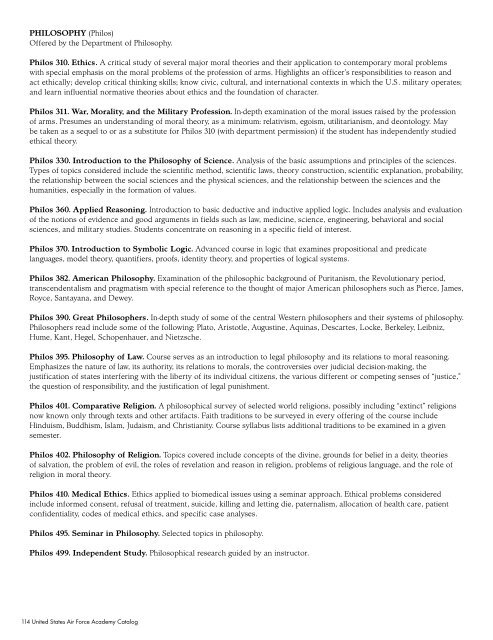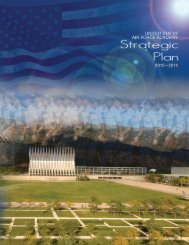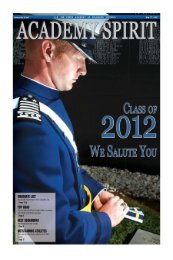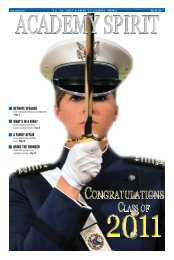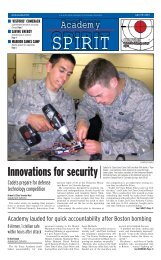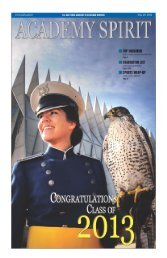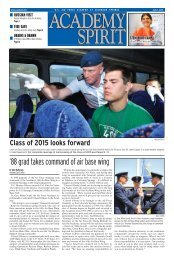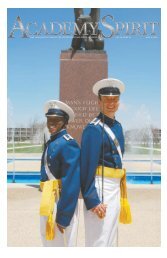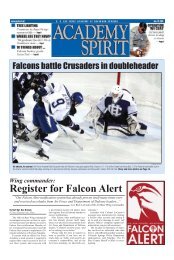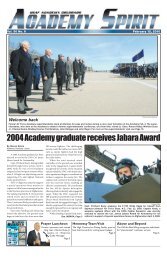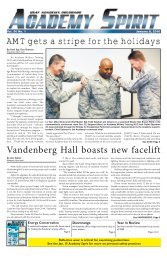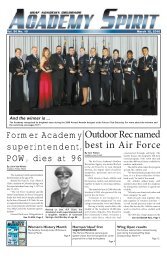2008-2009 Catalog - United States Air Force Academy
2008-2009 Catalog - United States Air Force Academy
2008-2009 Catalog - United States Air Force Academy
Create successful ePaper yourself
Turn your PDF publications into a flip-book with our unique Google optimized e-Paper software.
PHILOSOPHY (Philos)<br />
Offered by the Department of Philosophy.<br />
Philos 310. Ethics. A critical study of several major moral theories and their application to contemporary moral problems<br />
with special emphasis on the moral problems of the profession of arms. Highlights an officer’s responsibilities to reason and<br />
act ethically; develop critical thinking skills; know civic, cultural, and international contexts in which the U.S. military operates;<br />
and learn influential normative theories about ethics and the foundation of character.<br />
Philos 311. War, Morality, and the Military Profession. In-depth examination of the moral issues raised by the profession<br />
of arms. Presumes an understanding of moral theory, as a minimum: relativism, egoism, utilitarianism, and deontology. May<br />
be taken as a sequel to or as a substitute for Philos 310 (with department permission) if the student has independently studied<br />
ethical theory.<br />
Philos 330. Introduction to the Philosophy of Science. Analysis of the basic assumptions and principles of the sciences.<br />
Types of topics considered include the scientific method, scientific laws, theory construction, scientific explanation, probability,<br />
the relationship between the social sciences and the physical sciences, and the relationship between the sciences and the<br />
humanities, especially in the formation of values.<br />
Philos 360. Applied Reasoning. Introduction to basic deductive and inductive applied logic. Includes analysis and evaluation<br />
of the notions of evidence and good arguments in fields such as law, medicine, science, engineering, behavioral and social<br />
sciences, and military studies. Students concentrate on reasoning in a specific field of interest.<br />
Philos 370. Introduction to Symbolic Logic. Advanced course in logic that examines propositional and predicate<br />
languages, model theory, quantifiers, proofs, identity theory, and properties of logical systems.<br />
Philos 382. American Philosophy. Examination of the philosophic background of Puritanism, the Revolutionary period,<br />
transcendentalism and pragmatism with special reference to the thought of major American philosophers such as Pierce, James,<br />
Royce, Santayana, and Dewey.<br />
Philos 390. Great Philosophers. In-depth study of some of the central Western philosophers and their systems of philosophy.<br />
Philosophers read include some of the following: Plato, Aristotle, Augustine, Aquinas, Descartes, Locke, Berkeley, Leibniz,<br />
Hume, Kant, Hegel, Schopenhauer, and Nietzsche.<br />
Philos 395. Philosophy of Law. Course serves as an introduction to legal philosophy and its relations to moral reasoning.<br />
Emphasizes the nature of law, its authority, its relations to morals, the controversies over judicial decision-making, the<br />
justification of states interfering with the liberty of its individual citizens, the various different or competing senses of “justice,”<br />
the question of responsibility, and the justification of legal punishment.<br />
Philos 401. Comparative Religion. A philosophical survey of selected world religions, possibly including “extinct” religions<br />
now known only through texts and other artifacts. Faith traditions to be surveyed in every offering of the course include<br />
Hinduism, Buddhism, Islam, Judaism, and Christianity. Course syllabus lists additional traditions to be examined in a given<br />
semester.<br />
Philos 402. Philosophy of Religion. Topics covered include concepts of the divine, grounds for belief in a deity, theories<br />
of salvation, the problem of evil, the roles of revelation and reason in religion, problems of religious language, and the role of<br />
religion in moral theory.<br />
Philos 410. Medical Ethics. Ethics applied to biomedical issues using a seminar approach. Ethical problems considered<br />
include informed consent, refusal of treatment, suicide, killing and letting die, paternalism, allocation of health care, patient<br />
confidentiality, codes of medical ethics, and specific case analyses.<br />
Philos 495. Seminar in Philosophy. Selected topics in philosophy.<br />
Philos 499. Independent Study. Philosophical research guided by an instructor.<br />
114 <strong>United</strong> <strong>States</strong> <strong>Air</strong> <strong>Force</strong> <strong>Academy</strong> <strong>Catalog</strong>


